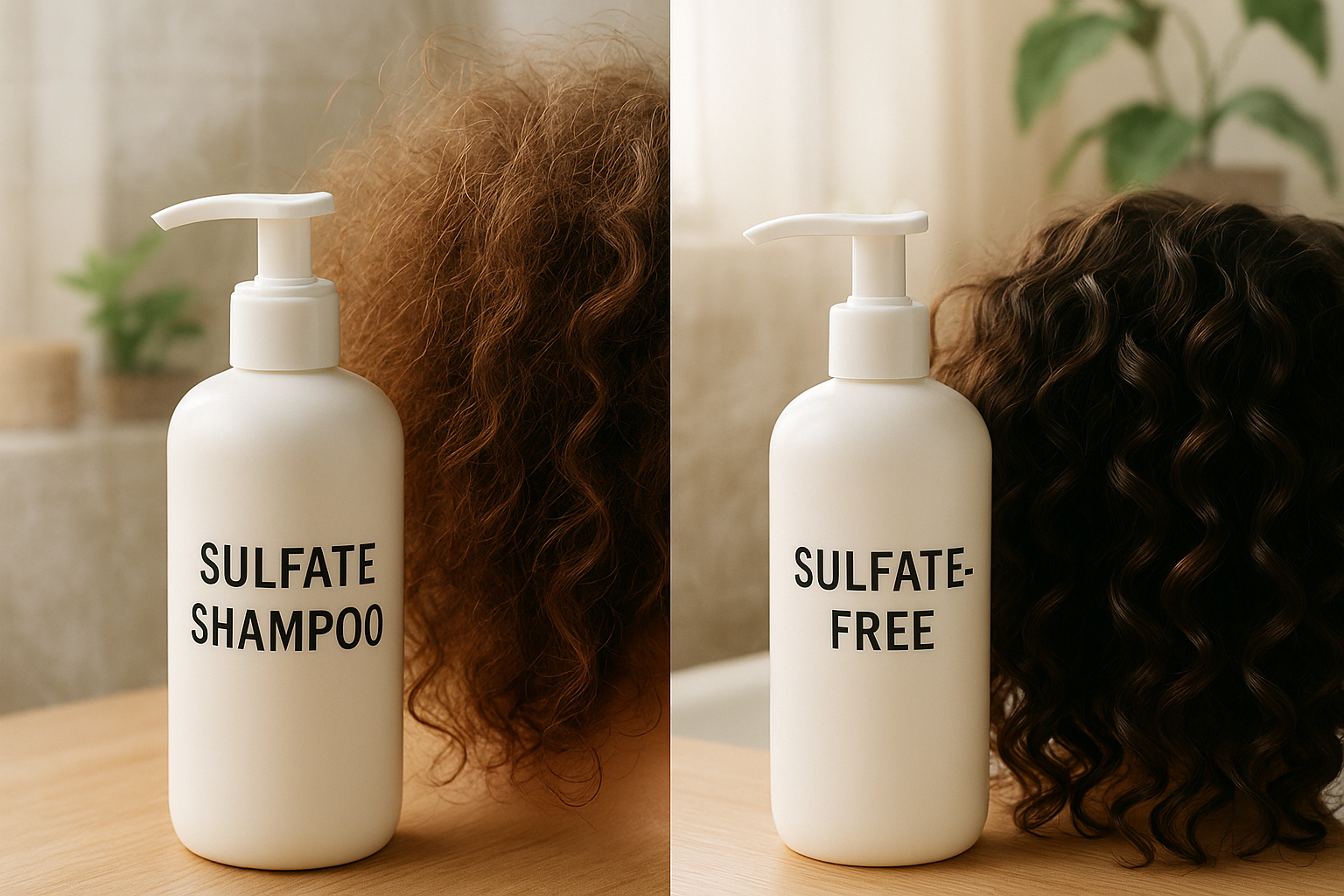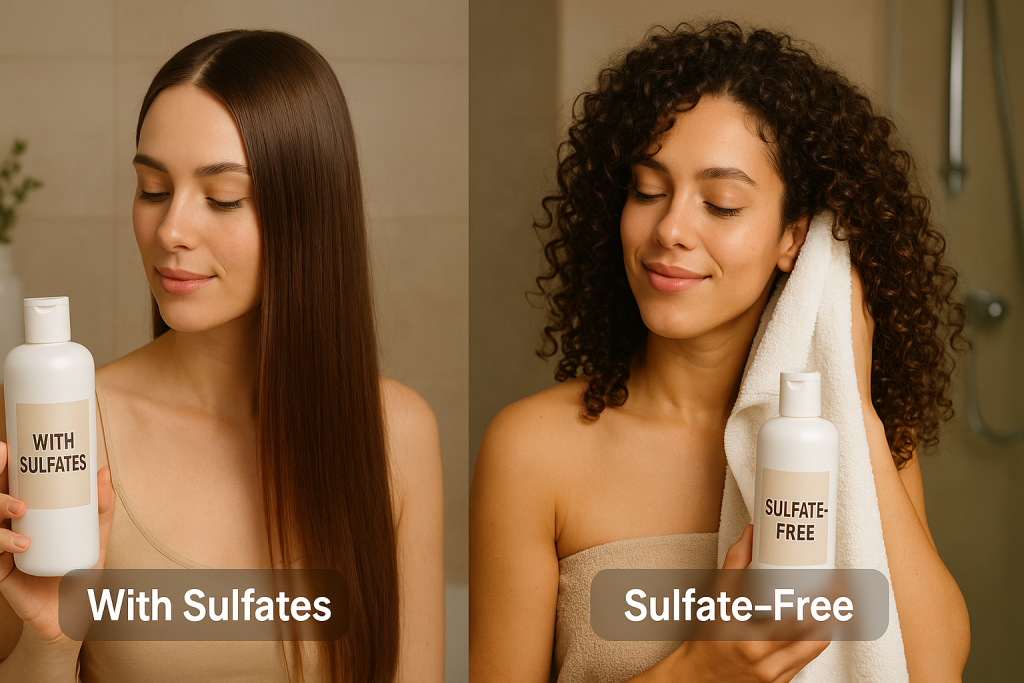
Why Sulfates Divide the Hair World
The debate about why curly hair hates sulfates is more than a beauty trend — it’s rooted in chemistry and scalp biology. If you’ve ever wondered why your curls feel dry and frizzy after a shampoo while your straight-haired friend swears by the same product, the secret lies in how sulfates interact with different hair textures.
2. What Are Sulfates, Really?
Sulfates are cleansing agents — surfactants — that help water and oil mix, allowing shampoo to lift dirt and grease off your scalp. The most common types are Sodium Lauryl Sulfate (SLS) and Sodium Laureth Sulfate (SLES).
They make shampoo foam, which many associate with cleanliness, but that “squeaky-clean” feeling can be damaging, especially for textured hair.
📎 External DoFollow Link: Healthline – What Are Sulfates and Are They Bad for Your Hair?
3. Why Curly Hair Hates Sulfates

Here’s where things get tricky — and personal. Curly hair naturally struggles to retain moisture because its shape slows down the travel of sebum (your scalp’s natural oil).
When you add sulfates, which aggressively remove oil, you end up stripping away what little protection curls have. The result:
- Frizz, brittleness, and dryness
- Weakened curl pattern
- More tangles and breakage
- Dull, undefined curls
💡 Pro Tip: If your curls lose bounce or feel “rough” after washing, sulfates are likely the culprit.
4. Why Straight Hair Can Tolerate Them (to a Point)
Straight hair, on the other hand, has a direct oil pathway from scalp to tip. Sebum moves easily along the shaft, which is why straight hair gets greasy faster.
This means mild sulfates can help control oil and buildup without destroying its natural balance — if used correctly. However, daily use or high-sulfate shampoos can still cause long-term dullness or split ends.
📎 Internal Link: Read: 7 Surprising Truths About How Often You Should Wash Curly vs Straight Hair
5. The Science Behind Oil, Shape & Moisture Retention
- Curly Hair: Elliptical follicles → uneven oil distribution → dry ends.
- Straight Hair: Round follicles → even oil flow → faster buildup.
When sulfates disrupt the scalp’s pH balance, curls react immediately with frizz, while straight strands appear clean but lose elasticity over time.
🧠 Fact: Hair with tighter curls (3B–4C) can lose up to 50% more moisture after a single wash with sulfate shampoo compared to straight hair (based on cosmetic chemistry studies).
6. Hidden Sulfates in Everyday Products
Even when a shampoo says “gentle,” it may still contain secondary sulfates. Check for these names:
- Ammonium Lauryl Sulfate
- TEA-Lauryl Sulfate
- Sodium Coco-Sulfate
They’re milder but can still cause dryness, especially in hot, humid climates like the Gulf.
7. Healthier Alternatives to Sulfate Shampoos
If you’re transitioning away from sulfates:
- Look for coconut-derived cleansers like Sodium Cocoyl Isethionate or Decyl Glucoside.
- Try co-washing (washing with conditioner) once a week.
- Choose products labeled “sulfate-free,” “moisture-rich,” or “color-safe.”
📎 External DoFollow Link: Byrdie – Best Sulfate-Free Shampoos for Every Hair Type
8. Regional Considerations: Gulf vs U.S. Haircare Needs
In UAE, KSA, Qatar, and Oman, humidity and hard water are key challenges. Curly hair needs extra hydration (look for leave-ins and deep conditioners), while straight hair benefits from lightweight detox shampoos once a week.
In the U.S., where climates vary, sulfate-free options work well year-round, especially during colder months when humidity is low.
9. Expert Advice: How to Transition Off Sulfates
- Alternate your washes. Start with one sulfate-free wash weekly.
- Clarify monthly. Use a gentle detox once a month to remove buildup.
- Hydrate constantly. Apply deep conditioner every week for curls, every 10 days for straight hair.
- Be patient. Your scalp needs 2–3 weeks to rebalance oil production.
The real takeaway on why curly hair hates sulfates is simple: curls crave moisture, not foam. Straight hair can tolerate sulfates occasionally, but overuse harms both textures in the long run.
Listen to your scalp — if your curls feel rough or your straight strands lose shine, it’s time to switch to a gentler formula.
✨ Healthy hair starts with understanding your texture — not following what’s trending on the bottle.


Leave a Reply